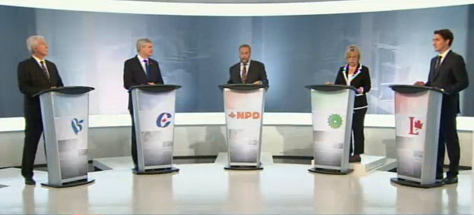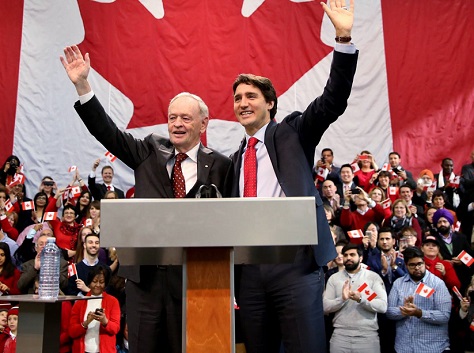Earlier this evening, I live-blogged the third debate among Canada’s major party leaders. It was the first French-language debate and the only one (so far) to include all five leaders: Conservative prime minister Stephen Harper, Liberal leader Justin Trudeau, New Democratic Party leader Thomas Mulcair, Green leader Elizabeth May and the pro-independence Bloc Québécois leader Gilles Duceppe.![]()
![]()
As #debatdeschefs takes place, Justin #Trudeau will try to win #Quebec‘s vote with a left turn on deficit spending: http://t.co/MU9dSBJBN0
— Kevin Lees (@Suffragio) September 25, 2015
Gilles #Duceppe now trying to explain why discrimination against Muslims is really about respecting women. Hmmm. #debatdeschefs #elxn42 — Kevin Lees (@Suffragio) September 25, 2015
#Trudeau: #Duceppe using niqab as wedge issue to disguise fact that Quebeckers think you can’t make a difference. #debatdeschefs #elxn42
— Kevin Lees (@Suffragio) September 25, 2015
#Mulcair: #Harper trying to hide his economic failures behind the niqab. #debatdeschefs #elxn42 — Kevin Lees (@Suffragio) September 25, 2015
Only woman on stage, @ElizabethMay, says niqab issue a phony debate to distract from real issue. #debatdeschefs #elxn42
— Kevin Lees (@Suffragio) September 25, 2015
#Trudeau deficits are making it easier for #Harper to pain both Libs/NDP as risky spenders despite recession. #elxn42 #debatdeschefs — Kevin Lees (@Suffragio) September 25, 2015
Gilles Duceppe is feisty in tonight’s #debatdeschefs, but fact is that #BlocQc faces extinction in #elxn42: http://t.co/1PLUy5fLZ0
— Kevin Lees (@Suffragio) September 25, 2015
#CPAC English version #debatdeschefs, totally badass translator sounds like a cross b/w Ernie from Sesame Street & Marge Simpson. — Kevin Lees (@Suffragio) September 25, 2015
#Mulcair: #Harper put all of Canada’s eggs in oil/gas basket, then he dropped the basket. Ka-ching! #elxn42 #debatdeschefs
— Kevin Lees (@Suffragio) September 25, 2015
Spanish — not Chinese or Punjabi — is third-most spoken language in Canada. Followed by Italian, German. https://t.co/76FA9yRUdO #elxn42 — Kevin Lees (@Suffragio) September 25, 2015
So when can we fast-forward to inevitably hot-tempered 20-minute sovereignty slugfest? #debatdeschefs #elxn42 #quebec #laurentianconsensus
— Kevin Lees (@Suffragio) September 25, 2015
“Pour toute les reste y a in MasterCard!” Ka-ching again. #Mulcair certainly came prepared with some zingers tonight. #elxn42 #debatdeschefs — Kevin Lees (@Suffragio) September 25, 2015
A look at why question of abolishing #Canada‘s senate is such a big issue in #elxn42: http://t.co/AOTPHUyptn #debatdeschefs
— Kevin Lees (@Suffragio) September 25, 2015
#Duceppe attacks monarchy. “When Quebec has its own country, we will have no senate and no monarchy.” #debatdeschefs #elxn42 — Kevin Lees (@Suffragio) September 25, 2015
#Harper: No appetite for reopening constitutional debate, no consensus on what to do w/ Senate. #debatdeschefs #elxn42
— Kevin Lees (@Suffragio) September 25, 2015
If #Harper loses power next month, it might be huge political mistake for him to have left 22 Senate vacancies #debatdeschefs #elxn42 — Kevin Lees (@Suffragio) September 25, 2015
#Duceppe keeps trying to bring up #Quebec independence; #Harper gently slaps down: “Debate is old, out-of-date.” #debatdeschefs #elxn42
— Kevin Lees (@Suffragio) September 25, 2015
Here we go. Most Laurentian of #LaurentianConsensus issues is #Quebec independence @JohnIbbitson @darrellbricker #elxn42 #debatdeschefs — Kevin Lees (@Suffragio) September 25, 2015
#Mulcair defense of 50%+1 vote on #Quebec play for soft nationalists,some #PLQ voters, some who support #CAQ/@francoislegault #debatdeschefs
— Kevin Lees (@Suffragio) September 25, 2015
Harper speaking to those west of Ottawa River when he (however calmly) says #Quebec question is settled. #elxn42 #debatdeschefs — Kevin Lees (@Suffragio) September 25, 2015
#Duceppe really trying to start a fight w/ #Mulcair over ‘respecting’ Quebec / process, but he’s grasping at best. #elxn42 #debatdeschefs
— Kevin Lees (@Suffragio) September 25, 2015
Did @pmharper just call the #Quebec independence debate ‘useless’? Ouch! #debatdeschefs #elxn42 — Kevin Lees (@Suffragio) September 25, 2015
#Mulcair just slapped #Trudeau support on C-51 (anti-terror) by comparing to father Pierre Trudeau’s War Measures Act #debatdeschefs #elxn42
— Kevin Lees (@Suffragio) September 25, 2015
Everyone on stage: “I’m not for this awful oil pipeline, I’m sort-of-for this other oil pipeline.” #debatdeschefs #elxn42 — Kevin Lees (@Suffragio) September 25, 2015
#Duceppe slap on Tom Mulcair vs Thomas Mulcair. NDP sensitive to saying one thing in English, another in French #debatdeschefs #elxn42
— Kevin Lees (@Suffragio) September 25, 2015
Export of QC/ONT rainwater (50% of North America’s) for US irrigation huge low-hanging fruit if we could find Coasian bargain #debatdeschefs — Kevin Lees (@Suffragio) September 25, 2015
Just imagine if US paid Quebec for freshwater to offset irrigation in drought-stricken Cali. No-brainer. @dianefrancis1 agrees! #elxn42
— Kevin Lees (@Suffragio) September 25, 2015
How #ISIS fight will go: #Harper-keep bombing, #Trudeau-take more refugees, #Duceppe-please remove their niqab. #elxn42 #debatdeschefs — Kevin Lees (@Suffragio) September 25, 2015
#AngryTom #Mulcair is angry about Canada being a meaner place. #elxn42 #debatdeschefs
— Kevin Lees (@Suffragio) September 25, 2015
#Duceppe making very good point that Canada shouldn’t sell weapons to Saudi Arabia, which funds Sunni jihadists. #elxn42 #debatdeschefs — Kevin Lees (@Suffragio) September 25, 2015
#Harper: We have largest export contract in history of Canada. Isn’t support for ISIS. Saudi Arabia a great ally #elxn42 #debatdeschefs
— Kevin Lees (@Suffragio) September 25, 2015
Everyone knows Martin Picard wins #debatdeschefs hands down w/ maple and foie gras and bacon poutine. https://t.co/7I4K3TFxfw — Kevin Lees (@Suffragio) September 25, 2015
Amazing is how well @pmharper‘s French language skills improved since 1st days as Canadian Alliance leader in 2002. #elxn42 #debatdeschefs
— Kevin Lees (@Suffragio) September 25, 2015
Would be great for @JebBush, @realDonaldTrump, @JohnKasich & @marcorubio in US to debate Saudi radicalism & Syrian refugees #debatdeschefs — Kevin Lees (@Suffragio) September 25, 2015

